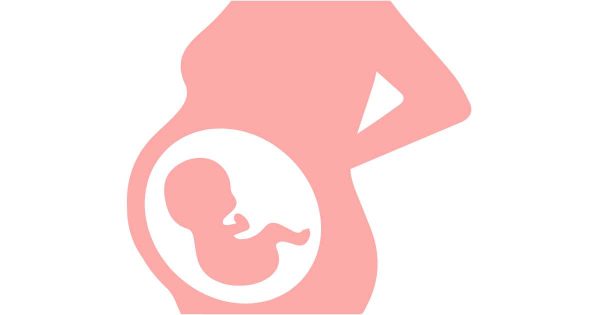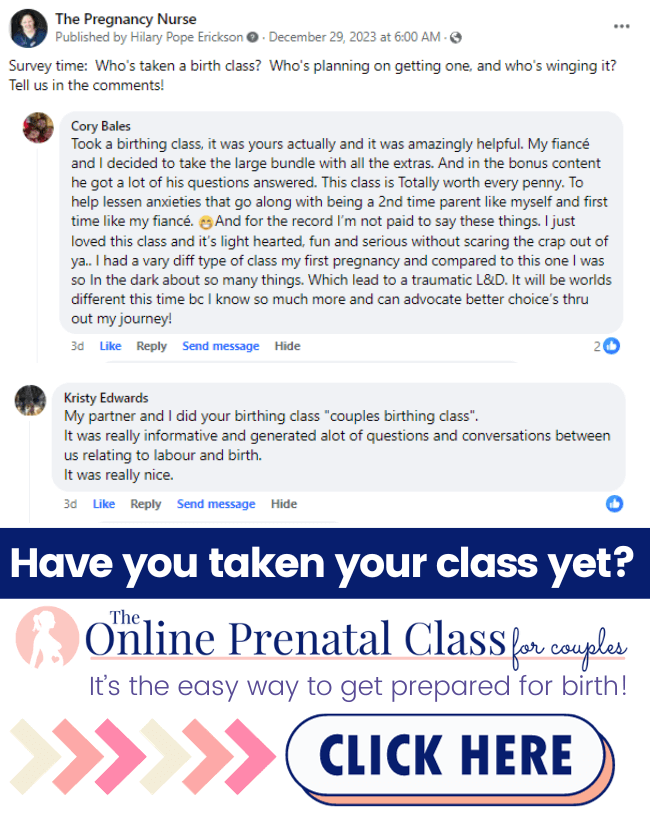👋 I’m so glad YOU are here. Are you looking to also get your partner prepared? This is for BOTH of you. Couples just love it and I know you want to both feel prepared!
Baby is a mover and a shaker some days in your belly, but what happens when baby’s movement slow down? This article is going to discuss why your baby’s movements may feel different, and what to do and consider if you feel your baby is moving less.

But, how do I know so much about fetal movement?
Hi — I’m Hilary — The Pregnancy Nurse 👩⚕️. I have been a nurse since 1997 and I have 20 years of OB nursing experience, I am also the curly head behind Pulling Curls and The Online Prenatal Class for Couples. 🩺 I have talked to hundreds of moms who feel like baby is moving less and helped monitor their baby and then decide what further treatment was necessary. I’ve also read a LOT of studies on fetal movement and what your recognition of it can mean. So, I’m a bit of an expert in this area. This is a real passion of mine, so I’m excited that you’re here!
This (or any article on The Pregnancy Nurse) should be taken as medical advice, this purely educational. Please talk with your provider about your specific needs and circumstances — especially in relation to fetal movement (it’s not something to mess around with).
Does Baby Movement Reduce at 30 Weeks
No. While fetal movements change throughout a pregnancy there should not be less kicks or movements at 30 weeks, but they may feel less severe or “crazy” at that point in time as the baby has less room to move in the uterus.
Baby’s movements in pregnancy is an important topic, and I want you to keep reading to understand it. We take decreased fetal movement VERY seriously at the hospital, and so should you.
This information is for those close to 30 weeks, if you’re looking for information for closer to 20 weeks check out my post on fetal movement in your lower abdomen at 20 weeks for more information on that.
Why do my baby’s movements feel different in late pregnancy?
As a woman progresses through pregnancy, she may notice that her baby’s movements feel different. In the beginning stages of pregnancy, the movements may feel like fluttering or gentle movements. But as the baby grows and develops, the movements become more significant and can feel like kicks, rolls, and jabs. In late pregnancy, as the baby grows bigger and has less space to move around, the movements may feel different. They may feel more frequent, erratic, and uncomfortable, especially when the baby is trying to move into a more comfortable position. These changes are perfectly normal and indicate that the baby is growing and developing properly. However, it is important to monitor the baby’s movements and contact a healthcare provider if there are any concerns about decreased movement.
The thing is, your baby’s movements should not feel significantly different day to day. There will likely be small changes in the movement each day — so, slowly baby’s more of a twisting movement vs the kicks you used to feel. Movements may very well be much different than they were last week, but if the changes were over the last week it isn’t as much as a concern. But kick counts are the keys to making sure baby is doing well.
Many people will say that baby’s movement slow down in late pregnancy, and I want to caution you on that. Baby’s movements CHANGE in later weeks. Their movement patterns adjust because the uterus is just not giving them as much room. However, they should still be moving. If you’re feeling fewer movements (of any kind), it is a concern that you need to address.
For me, it’s a reminder that a few weeks ago they were able to bend their leg more and give you a full kick, where is now they just sort of adjust their leg and flex their toes because it’s just getting cramped (and will continue to get more cramped as baby gets bigger). However, that leg should still be moving.
How often should baby move at 30 weeks?
There is no “number” that is correct for you and your baby. Every baby’s movements will be different. What is important is what is normal for YOU and YOUR baby, which is why we recommend kick counts.
What are kick counts?
Kick counts have been proven to be the best way to track baby’s well-being on your own. Yes, better than those dopplers or home ultrasound machines. It really is the BEST way.
How do you do do kick counts?
I go into it in detail in here, but here are the basics (if you don’t know anything about them I suggest you read that article though)
- Start at the beginning of your third trimester — 27 weeks (or today, if you’re already into it)
- You’re going to lay still and feel for baby to move 10 times.
- Note how long it takes for baby to move 10 times, and then go on with your day.
From day to day this shouldn’t change much. Yes, one day it’s 30 minutes, the next it’s 35, but if you’re headed to an hour and baby still hasn’t given you those 10 movements, you need to wonder what’s up.
Kick Count Pro Tips:
- Make sure you eat a meal or a snack (balancing carbs and proteins — and we talk about that in here)
- Have a nice glass of water by you while you do kick counts to stay hydrated. Bonuses are if it’s ice water as that often wakes baby up.
- Try to do them at a similar time each day (but if you can’t make that time work, do it as best you can — doing them every day is important)
- Cherish this time — it’s a great way to bond with baby. Talk to them and tell them all your dreams for them, enjoy it!
- I did mine after dinner to let my husband clean up, it was a win-win. 🙂
I did a podcast that might help give you more info:
I can’t tell you how important kick counts are. When kick counts are implemented it can save 1/3 stillborns. That site I just linked to also has a great fetal movement kick count app if that appeals to you (although I just used my fingers and noted it on a notepad back in the day). Many other pregnancy apps also have kick count options if you already have a few.
How Long Should Kick Counts Take?
I have heard some people just talk about a “two hour” mark — and that if kick counts are taking longer than that, it’s a problem. Or they say that you just see how long it takes and if it’s less than 2 hours you’re OK. However, the studies really show that the best use of kick counts is baby’s movements from day to day, and the maternal perception of fetal movements, not so much a strict timeline.
Most people do kick counts (especially if they do them right after eating) in less than an hour, but every baby is going to be different. And it really depends on what your baby’s usual pattern of movement has been and that from day to day it shouldn’t change too much.
Kick counts are SO important, but they aren’t the only thing that is important. If you’re around 30 weeks I can’t recommend taking a all-in-one prenatal class so you’re not missing out on anything important.
I recommend this class, it straightforward but not scary and it can be done in just a few hours with your partner (if you want). In there you’ll learn more pro tips like kick counts to help you make it through the rest of pregnancy, birth and life after baby!
Statistics & Studies on Fetal Movement
Let’s dive a bit into the studies on fetal movement:
Noticing Decreased Fetal Movement is Not Unusual
Many women notice they haven’t felt baby move as much that day. This study showed that about 8% of women note decreased movement at some point during the third trimester.
In the hospital we often get people who come in for decreased fetal movement, and we’re just glad when we have baby on the monitor and everything looks OK. At that point we can either order further testing, or you can just continue prenatal care with your provider.
Decreased Movement Often Leads to Stillbirth
This study showed that about 30% of moms who felt decreased movement faced a stillbirth soon after. I don’t say that to worry you, but I do say that to say that kick counts are easy to do, and it’s a great way to not only bond with your baby, but to know that they are OK.
A lot of people feel like kick counts are too old fashioned and many providers don’t even talk about them.
However, on the ACOG page for fetal testing, they actually list kick counts. They put it among all the other 3rd trimester testing we do, including ultrasounds and lab work. It’s not old fashioned, it’s just been used over time to help babies grow and thrive.
Ok, but since we’ve just said it’s really normal for you to feel decreased fetal movement, but absolutely nothing is wrong — what do you do?
What should I do if my baby’s movements reduce or change?
Personally, I always ask moms to do a few things:
Stop what you’re doing, grab a snack and some water and sit.
This is for a variety of reasons:
- Eating is important. Many women who come into the hospital for decreased fetal movement haven’t eaten for HOURS and as soon as they get some food in them, baby is kicking per the usual. So, make sure you’re eating small meals throughout the day (bonus if they balance carbs and proteins)
- Hydration is key. Baby loves it when you’re hydrated, and there’s a bonus if it’s ICE water, because your stomach is close enough to your uterus that sometimes that cold transfers over and wakes baby up. They’ll kick to let you know they notice it’s cold!
- You’re busy! Sometimes we just get caught-up in our day and we don’t notice that baby IS moving but we’re just not noticing it as much.
That last one can happen easier as your pregnancy progresses. No longer will it seem like war of the worlds in your belly, but it will be more rolling, twisting, and stretching you feel rather than full-blown kicks.
However, if you really haven’t noticed baby move for a while (especially if you have been eating and drinking per your usual), you can do all of theses in the car as you are on the way to the hospital. This isn’t something you want to waste a lot of time doing if baby truly isn’t moving much.
If baby starts being their usual self after you’ve done those things it’s still something to talk with your provider about, but not something to head into labor and delivery for. I’d just call your provider and see what they recommend.
Now, if you have to do all those things to ever elicit movement that’s not awesome, and something you definitely want to talk with your provider about.
How often should my baby move in utero?
As a parent-to-be, it can be concerning to wonder how often should my baby move in utero. It’s common to feel fetal movement for the first time between 16 and 25 weeks of pregnancy. As the pregnancy progresses, your baby’s movements become more frequent and stronger.
During the third trimester, you should feel movement throughout they day. However, every baby is different, and some may move less frequently than others.
It can be hard to hear a friend who feels baby all the time and all over the place if you’re not feeling the same thing. You may worry that baby isn’t growing and thriving like you’d like them to, but there are a variety of factors as to how you feel the fetal movement, so the important thing is to know what YOUR baby’s fetal movements are like.
It’s essential to keep track of your baby’s movements (do your kick counts) and seek medical attention if you notice a decrease in the number of movements. Overall, paying attention to fetal movement is an essential part of prenatal care, and is easily done at home on your own.
Ok, now that we’re this far into it, I hope you are feeling baby move more now. I would also like to remind you that 30 week’ish is the PERFECT time to start one of these too! Studies show it improves birth outcomes!
Why are my baby’s movements important?
Fetal movements are your only indicator of baby’s well-being day to day.
Feeling your baby move is an essential aspect of pregnancy, as it allows you to gauge the health and well-being of your little one. A baby’s movements are a sign of good health and development, indicating that they are receiving adequate oxygen and nutrients.
By feeling your baby move regularly, you will be able to develop a deeper connection and bond with your baby, as well as gain reassurance that they are thriving inside the womb. However, it’s also important to be aware of any changes in your baby’s movements, as a decrease or sudden increase in movement could be an indication that your baby is unwell.
By paying attention to your baby’s movements and contacting your healthcare provider if anything seems off, you can help ensure the best possible outcome for both you and your baby.
Is there anything that can affect being able to feel my baby move?
There are several factors that can affect being able to feel your baby move.
The position of the baby in the womb can play a significant role. If the baby is facing towards the back or the placenta, it may be harder to feel movements. Additionally, as the pregnancy progresses and the baby grows, it may start to run out of space to move around, and you may find that the movements feel different.
The position of the placenta can play a role too. If the placenta is at the front of the uterus (called an anterior placenta) it “muffles” some of what you’d normally feel by being there. Women mostly feel the kicks in the front (as that’s where our muscles close to the uterus are) and think of it as a pillow between the baby and you. So, you just feel less.
However, it is important to note that feeling regular movement is a positive sign of your baby’s health and wellbeing. If you notice a decrease in movement, it is crucial to contact your healthcare provider immediately as it can indicate potential problems with the pregnancy. Overall, while there are certain factors that can affect how much movement you feel, it is important to be aware of your baby’s movements and notify your healthcare provider of any changes.
You may feel like I’m a little heavy-handed in the whole “contact your provider immediately” stuff, but as an RN who has seen the consequences of ignoring fetal movement far too often I can only stress to you that it is REALLY important, and there is a REASON I am so passionate about this.
What if my baby’s movements are reduced again?
If you’ve gone to the hospital before for reduced fetal movement, but you’re feeling it again — go again.
As I shared above, about 30% of people who have had decreased fetal movements face stillbirth within the week — meaning it may not happen right away, but it is something that needs to be monitored.
If the nurse at the hospital says baby looks well, take the time to really feel for baby to move in the hospital, and ask them what you can do to feel more reassured. Your provider may want to order some NST’s (non stress tests, and we talk about what those are in chapter 2 in here) to monitor baby if fetal movement is a concern.
But again, it’s about what’s normal for YOUR baby. Keep doing those kick counts and monitoring them. It also gives you a number to talk with your providers about. It is a lot more concerning to hear
“Most days it only takes about 15 minutes to get 10 movements, but the past 3 days it’s taken over an hour.”
Than: “Baby just seems to be moving less.”
Pro Tip: During kick counts you’re looking for ANY fetal movement (besides hiccups — which are much more rhythmic and bouncy). So you still count all the things, not just the things (twisting turning, adjusting) not just baby kicks like it maybe used to be.
Not sure what hiccups are, ask your provider at your next visit. For me, they tend to happen every few seconds and I mostly felt them “bounce” not so much as “move”. Hiccups are a very normal part of the baby growing and getting their respiratory system goin. Personally, I found them sweet but annoying when I was trying to concentrate.
Is it Bad When the Baby Moves too Much?
In general, no. There are some very weird things that we as a medical community watch out for, but if baby all the sudden moves a bunch it can be for a variety of reasons.
If you feel like baby is moving more (or possibly too much) please do discuss it with your provider so they can ascertain if things are progressing normally for you.
When should I start to feel fetal movement?
You can feel baby move starting usually around 20 weeks (sometimes before or a bit after that depending on baby’s position and the placement of your placenta). However, patterns of movements that are enough to understand their well being don’t really happen until your third trimester, which is why we don’t recommend kick counts until that point.
Mom’s who have previously been pregnant often feel the movements earlier because they know what they are looking for. Those early movements can also feel similar to tummy rumbles or gas, so some first time moms might “miss” them (which is fine, there’s no issue if you’re not feeling baby until a couple of weeks later that early on).
Ok, that’s fetal movement at 30 weeks for you. This article gives you three takeaways:
- Fetal movement isn’t an old fashioned way to track your baby’s well-being, but a time-tested way for you to both bond with baby and make sure things are OK. They should be done every day.
- If you’re feeling baby move less you need to contact your provider.
- 30 weeks is also your best time to start a prenatal class to feel prepared for birth!
I recommend The Online Prenatal Class for Couples, although over 100 reviews mean you don’t have to take my word for it. It comes at a great price, and can be done in just a few hours. It’s taught by a highly experienced RN and most people enjoy the process, rather than dread it.
And, if you’re not quite sure you’re ready for that whole thing, check out my free prenatal class. It’s your first step toward getting in the driver’s seat of your birth.








 Signs of Labor
Signs of Labor
